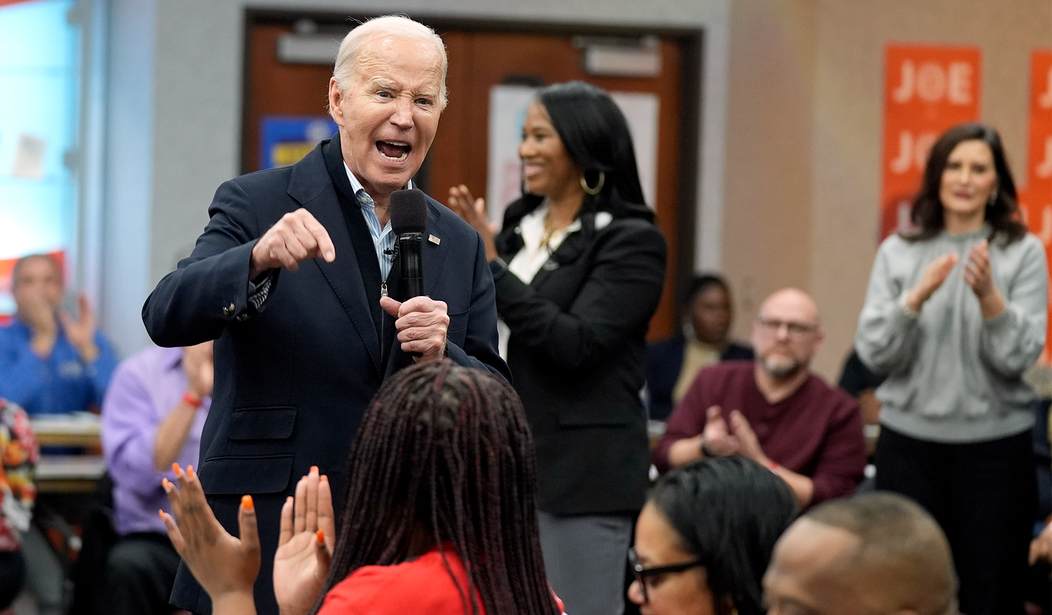During more than three years of his presidency, Joe Biden has become known as much for his bursts of anger and yelling as for his serial lying and concocting mumbling words that make zero sense.
The question is, why is that?
Again, we all see it — including Democrats who absurdly counter that the 81-year-old president is "fiery" or "forceful" — but why does he do it?
Thursday's State of the Union address was the most important speech of Biden's more than 50 years in national politics. He had one last opportunity to at least try to somewhat heal — if just a bit — a nation further fractured by his divisive presidency.
Yet, there Joe was: "Us against them" vs. "Let's try to come together." The latter was not to happen.
Instead, a very angry president screamed at House Republicans and about Donald Trump — and even looked the Supreme Court justices in the eye and politically chastised them over Roe v. Wade, as he defiantly pledged to make Roe the law of the land if he wins reelection.
And from the beginning to the end, nothing but anger, yelling, and bitter divisive rhetoric.
Again, why?
There's a strong possibility that Biden can't help it. Or that he now thinks his anger and yelling demonstrate leadership. They don't. While I'm neither excusing nor justifying Biden's SOTU behavior, I'm suggesting that he convincingly demonstrated on Thursday that he suffers from dementia.
Verbal Outbursts in a Patient with Dementia
Now, I'm not a doctor, and I'm certainly not qualified to make a professional diagnosis here, so I gathered professional information from several qualified sources, beginning with the Consultant360 Multidisciplinary Medical Information Network:
Verbally disruptive behaviors among patients with dementia are common. The behaviors include screaming, yelling, cursing, calling out, repeating words and phrases, and making noises that may not include words ...
Verbal disruption is a great source of caregiver burden and patient distress. Ongoing behavioral problems often result in premature nursing home placement.
The prevalence of verbally disruptive behaviors among patients with dementia is high, with up to 25% of patients living in the community and 50% of those who reside in nursing facilities displaying at least one verbally disruptive behavior.
Verbal disruption is more likely to occur in the later stages of dementia, when the patient is less able to communicate using language and speech.
Remind you of any president we know?
According to the Alzheimer's Society, the middle stages of dementia can include:
For many people with dementia, the middle stage is when symptoms will get worse. This is also when changes in behavior generally start. This stage of dementia is often the longest. On average it lasts about two to four years, during which time symptoms are likely to develop in the following ways:
- Existing problems with memory and thinking will worsen in the middle stage. Many people find it harder. ... Remembering new information will also get harder. This may cause the person to repeat the same question over and over.
- The way a person speaks or uses language is likely to get worse at this stage too. They may have problems finding the right word and they may forget what they are saying mid-sentence. It may get harder for them to follow what someone else is saying.
- In this stage many people start to strongly believe things that aren’t true (delusions). They often feel other people are going to harm them or cannot be trusted (paranoia). It is very common for a person to believe that someone is stealing from them or that a partner is being unfaithful.
- screaming or shouting
Again, remind you of anyone?
How to Manage Agitation Related to Dementia
According to Harvard Health Publishing, to decrease agitation and aggression in people with dementia, non-drug options are more effective than medications in decreasing agitation and aggression in people with dementia. Physical activity, touch and massage, and music can all be used as tools to manage agitation related to dementia.
Note to Democrats: Harvard didn't include "being president" or "running for reelection."
RELATED:













Join the conversation as a VIP Member